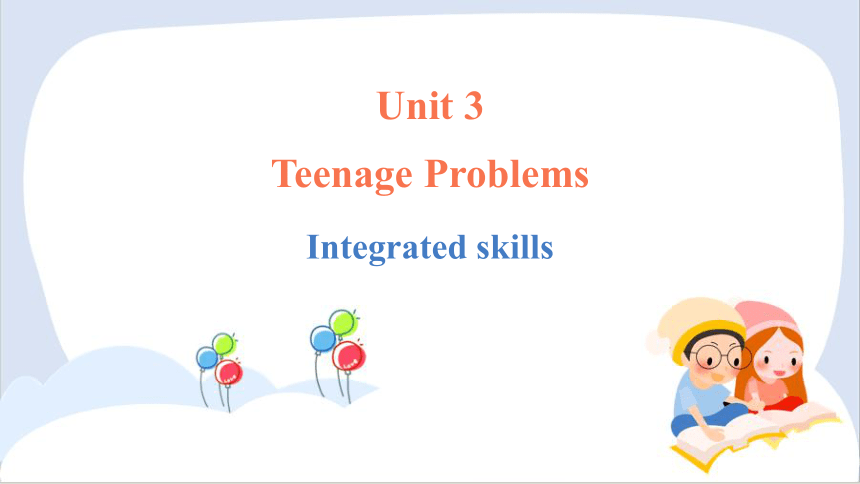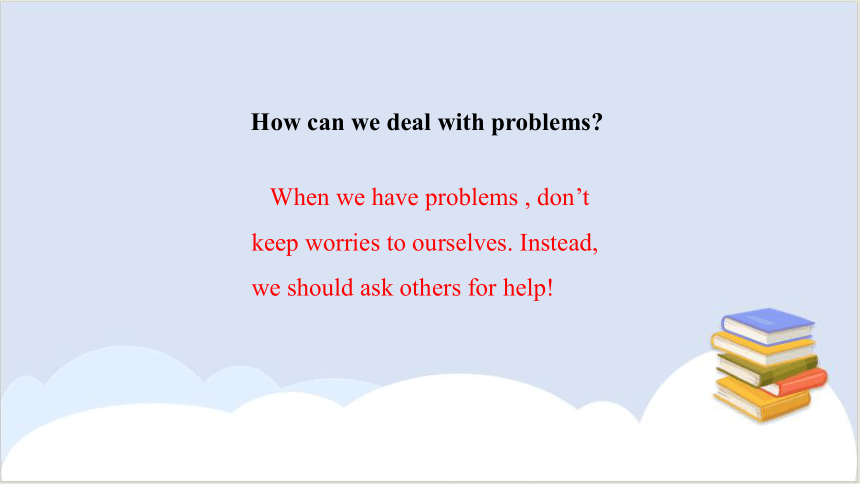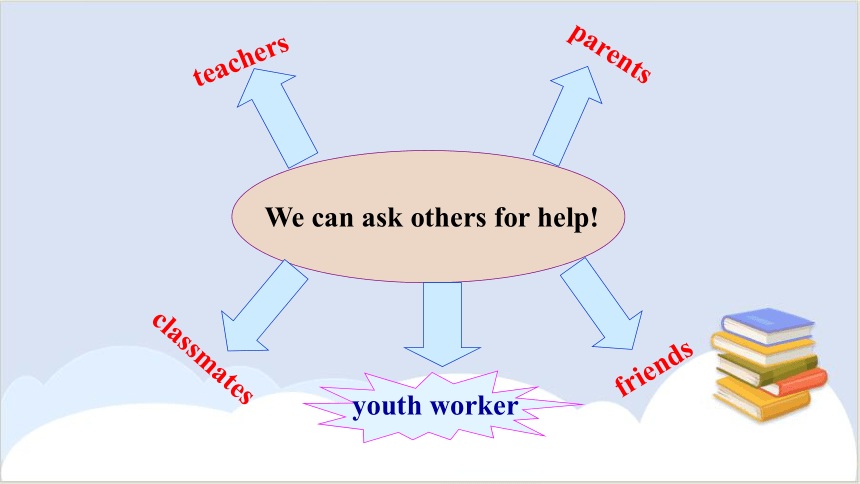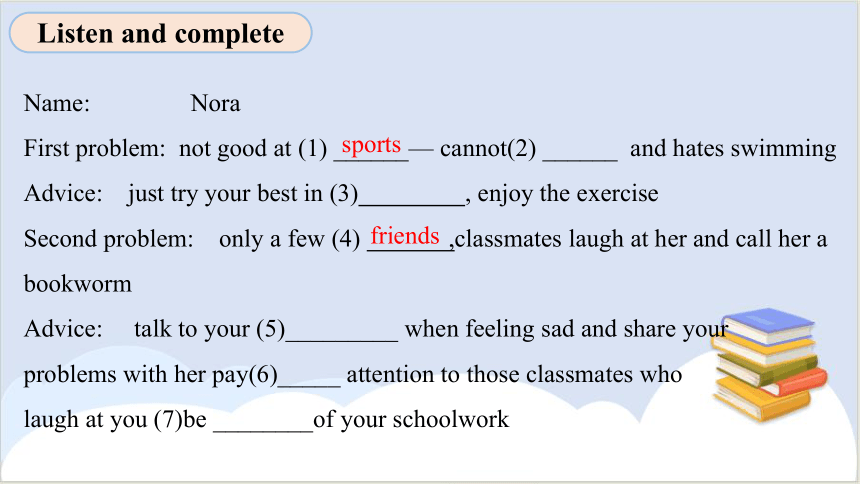Unit 3 Teenage problems Period 4课件+音频(共18张PPT)牛津译林版九年级上册
文档属性
| 名称 | Unit 3 Teenage problems Period 4课件+音频(共18张PPT)牛津译林版九年级上册 |  | |
| 格式 | pptx | ||
| 文件大小 | 4.3MB | ||
| 资源类型 | 教案 | ||
| 版本资源 | 牛津译林版 | ||
| 科目 | 英语 | ||
| 更新时间 | 2024-10-20 12:07:54 | ||
图片预览







文档简介
(共18张PPT)
Integrated skills
Unit 3
Teenage Problems
1. 能熟悉并正确运用本课时的重点单词和短语。
2. 能从听力材料中得到需要的信息,了解Nora的问题及其解决方法。
3. 能用英语谈论自己的问题并为他人提出建议。
学习目标
When we have problems , don’t keep worries to ourselves. Instead, we should ask others for help!
How can we deal with problems
We can ask others for help!
parents
teachers
classmates
friends
youth worker
Sigmund Friend
youth worker
How does he help teenagers solve problems
Find people’s problems
Take notes
Give advice
Write reports
Millie’s classmate Nora
a Grade 9 student □
one of the top students □
loves English , Maths and Chemistry □
(化学)
always gets high marks in exams □
not very good at sports □
has many friends □
√
√
√
√
√
新课讲授
Name: Nora
First problem: not good at (1) ______— cannot(2) ______ and hates swimming
Advice: just try your best in (3) , enjoy the exercise
Second problem: only a few (4) ,classmates laugh at her and call her a bookworm
Advice: talk to your (5)_________ when feeling sad and share your
problems with her pay(6)_____ attention to those classmates who
laugh at you (7)be ________of your schoolwork
sports
friends
Listen and complete
Listening tips(技巧)
Before listening, we can predict (预测) the missing information according to (根据) the information we have known and the context (上下文).
(在做听力之前,我们可以尝试根据已知的信息和上下文语境来预测所缺内容)
e.g. ___________________ attention to those classmates who laugh at(嘲笑) you
Don’t pay any
Tip 1
/ Pay no
pay attention to
Tip 2
When we listen to long conversations or passages, we can try to make shorthand notes(速记) , such as writing down the key information (关键信息)or the first letter of a word.
(当我们听较长的对话或短文时,可以尝试速记,如记录关键信息或单词首字母)
e.g. I’m good at English, Maths and Chemistry, but I’m not good at sports.
I’m good at English, ______ and Chemistry, but I’m not good at _____.
M
s
aths
ports
Name: Nora
First problem: not good at (1) ______—cannot(2) ______ and hates swimming
Advice: just try your best in (3) , enjoy the exercise
Second problem: only a few (4) ,classmates laugh at her and call her a bookworm
Advice: talk to your ()_________ when feeling sad and share your problems with her; pay(6)_____ attention to those students who
laugh at you (7)be ________of your schoolwork
friends
sports
run fast
PE class
no
best friend
proud
A bookworm is someone who spends a lot of
time reading books.
bookworm
Nora is one of the __________in her class at Sunshine Middle School. Her favourite subjects are ________ _________ and _________ .
Nora does well in exams, but she still has some problems. She is not very good at sports. She cannot _________ and hates___________. Also, sometimes her classmates _________ her and call her a bookworm . This makes her feel bad.
Nora
top students
English
Maths
Chemistry
run fast
swimming
laugh at
Report
I told her what to do in PE class. She should just ____________ and ___________________. I also told her to ______________________ the classmates who laugh at her.
Now, Nora seems much happier than before. She still finds sport difficult, but she can talk to her best friend Betty when she feels sad and ____________________ with her. She should be ___________her schoolwork.
try her best
enjoy the exercise
pay no attention to
share her problems
proud of
We should help each other!
B
Speak up:
Listen & answer
sharing problems and giving advice
What is Daniel’s problem
2. How does he feel
He has made little progress(进步) in his English.
He is very worried.
What suggestions does Millie give him
Go over(复习) what he has learnt as often as possible.
Read English aloud(大声地) every morning.
Try to pronounce(发音) all the words correctly(正确地).
Read and answer
A: I have a problem. …
B: I’m sorry to hear that. Don’t worry. It takes time.
A: Can you give me some advice
B: Maybe / Perhaps /Why not /How about...
A: Thank you. I feel much better now.
B: Don’t mention it(不客气)./You’re welcome.
Pair work
Don’t be afraid of problems.
Face them, solve them, and you’ll succeed.
Remember: Impossible is nothing.
John Gurdon, Nobel Prize winner, used to be laughed at by his classmates and even his teachers, because of his low grades.
Integrated skills
Unit 3
Teenage Problems
1. 能熟悉并正确运用本课时的重点单词和短语。
2. 能从听力材料中得到需要的信息,了解Nora的问题及其解决方法。
3. 能用英语谈论自己的问题并为他人提出建议。
学习目标
When we have problems , don’t keep worries to ourselves. Instead, we should ask others for help!
How can we deal with problems
We can ask others for help!
parents
teachers
classmates
friends
youth worker
Sigmund Friend
youth worker
How does he help teenagers solve problems
Find people’s problems
Take notes
Give advice
Write reports
Millie’s classmate Nora
a Grade 9 student □
one of the top students □
loves English , Maths and Chemistry □
(化学)
always gets high marks in exams □
not very good at sports □
has many friends □
√
√
√
√
√
新课讲授
Name: Nora
First problem: not good at (1) ______— cannot(2) ______ and hates swimming
Advice: just try your best in (3) , enjoy the exercise
Second problem: only a few (4) ,classmates laugh at her and call her a bookworm
Advice: talk to your (5)_________ when feeling sad and share your
problems with her pay(6)_____ attention to those classmates who
laugh at you (7)be ________of your schoolwork
sports
friends
Listen and complete
Listening tips(技巧)
Before listening, we can predict (预测) the missing information according to (根据) the information we have known and the context (上下文).
(在做听力之前,我们可以尝试根据已知的信息和上下文语境来预测所缺内容)
e.g. ___________________ attention to those classmates who laugh at(嘲笑) you
Don’t pay any
Tip 1
/ Pay no
pay attention to
Tip 2
When we listen to long conversations or passages, we can try to make shorthand notes(速记) , such as writing down the key information (关键信息)or the first letter of a word.
(当我们听较长的对话或短文时,可以尝试速记,如记录关键信息或单词首字母)
e.g. I’m good at English, Maths and Chemistry, but I’m not good at sports.
I’m good at English, ______ and Chemistry, but I’m not good at _____.
M
s
aths
ports
Name: Nora
First problem: not good at (1) ______—cannot(2) ______ and hates swimming
Advice: just try your best in (3) , enjoy the exercise
Second problem: only a few (4) ,classmates laugh at her and call her a bookworm
Advice: talk to your ()_________ when feeling sad and share your problems with her; pay(6)_____ attention to those students who
laugh at you (7)be ________of your schoolwork
friends
sports
run fast
PE class
no
best friend
proud
A bookworm is someone who spends a lot of
time reading books.
bookworm
Nora is one of the __________in her class at Sunshine Middle School. Her favourite subjects are ________ _________ and _________ .
Nora does well in exams, but she still has some problems. She is not very good at sports. She cannot _________ and hates___________. Also, sometimes her classmates _________ her and call her a bookworm . This makes her feel bad.
Nora
top students
English
Maths
Chemistry
run fast
swimming
laugh at
Report
I told her what to do in PE class. She should just ____________ and ___________________. I also told her to ______________________ the classmates who laugh at her.
Now, Nora seems much happier than before. She still finds sport difficult, but she can talk to her best friend Betty when she feels sad and ____________________ with her. She should be ___________her schoolwork.
try her best
enjoy the exercise
pay no attention to
share her problems
proud of
We should help each other!
B
Speak up:
Listen & answer
sharing problems and giving advice
What is Daniel’s problem
2. How does he feel
He has made little progress(进步) in his English.
He is very worried.
What suggestions does Millie give him
Go over(复习) what he has learnt as often as possible.
Read English aloud(大声地) every morning.
Try to pronounce(发音) all the words correctly(正确地).
Read and answer
A: I have a problem. …
B: I’m sorry to hear that. Don’t worry. It takes time.
A: Can you give me some advice
B: Maybe / Perhaps /Why not /How about...
A: Thank you. I feel much better now.
B: Don’t mention it(不客气)./You’re welcome.
Pair work
Don’t be afraid of problems.
Face them, solve them, and you’ll succeed.
Remember: Impossible is nothing.
John Gurdon, Nobel Prize winner, used to be laughed at by his classmates and even his teachers, because of his low grades.
